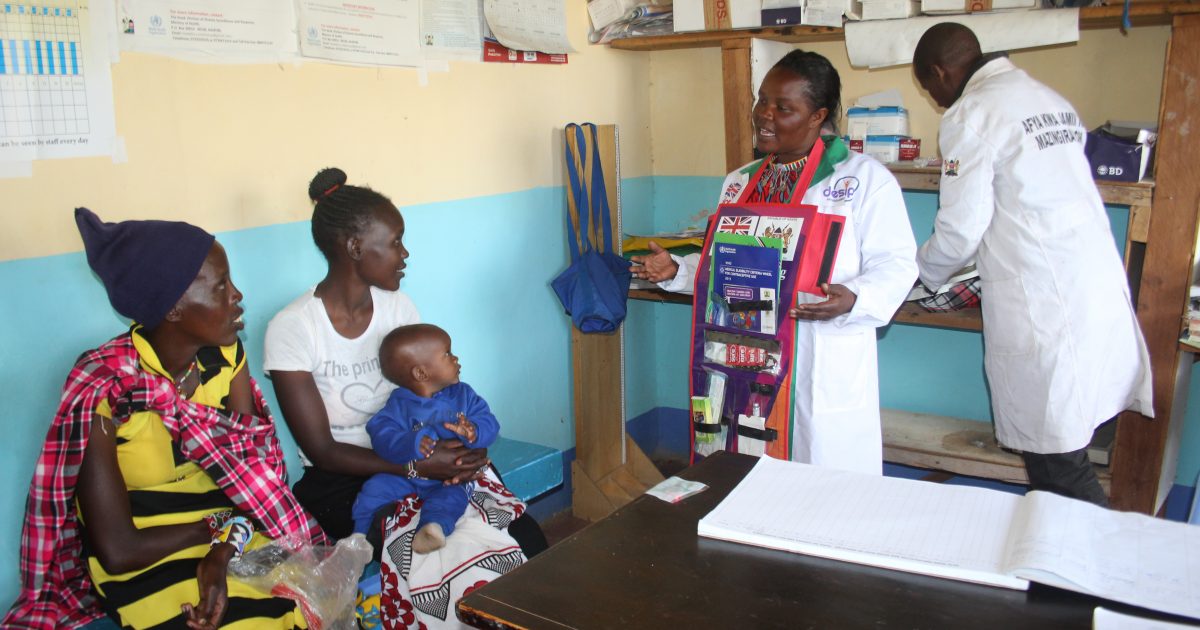The dusty Ntulele-Ongata Naado road meanders across a silent scarcely populated remote village inhabited by the Maa community and terminates at Ongata Naado level-two hospital.
The presence of scrubs and livestock feeding on bare vast lands is an indication that the area is among parts of Narok County that experiences prolonged seasons of dry spell.
After driving for half an hour along the rough road, we arrive at the home of Annet Kaigal, a Community Based Distributor (CBD) who has been championing modern family planning methods in the area.
Kaigal doubles as a spiritual leader as she heads a local church in the village, where hundreds of faithful seek spiritual nourishment.
As we interacted with her, she reveals that she was among the first people in the village to embrace modern family planning methods, which she has been teaching the women in the village in a bid to have a manageable family.
The mother of five, says she was trained by the New Partnership Initiative (NPI) program through the Anglican Development Service (ADS), where she was among many other women trained to distribute and offer family planning methods to the women.
“When I realized that the traditional way of family planning was not working, I decided to champion the modern family planning methods in my village. I am very lucky because my husband supported me throughout,” she says.
Kaigal explains that the traditional way of family planning in the Maa community was merely a separation of the man and woman for the period that the child was breastfeeding.
But according to her, the traditional method brought more harm to the community as the man would move around the village looking for women lovers, while the woman would also look for secret lovers, besides her husband to satisfy her sexual needs.
“This was dangerous as it increased chances of contracting Sexually Transmitted Diseases (STDs) among them HIV/Aids,” she explains, adding that the method was not efficient as women got pregnant immediately they united back with their husbands.
Kaigal lauded the ADS program for prioritizing the village to enlighten both women and men in the area on the modern Family Planning (FP) methods.
She recalls that through the program, she was trained on how to administer family planning methods among them oral contraceptives pills, implants, injectable and condoms.
At the start, she says, it was very difficult to convince the Maa women to accept the modern family planning methods as the community believed that they would make the women infertile, while others associated them with diseases such as cancer.
Men in the community were equally opposed to family planning as they believed the method would remove the urge of sex from the women or become promiscuous.
Nevertheless, Kaigal explains how she boldly engaged both women and men in separate sensitization forums, where she educated them on the importance of family planning.
“The church was also opposed to the practice and being a pastor; I received a lot of opposition and rejection. But with time, I was able to convince the congregation to accept the modern way of family planning,” reiterates Kaigal.
“Sometimes I was forced to pop in men forums, where I explained to them the program. At the beginning they rejected the whole idea and even criticized me. Though it was challenging, I did not give up because I wanted to help my community. I continued until the community willingly accepted,” she continued.
However, since Kaigal started the trainings about two years ago, the negative myths on the practice is slowly dying out, while the community has willingly accepted to use the existing FP methods.
“I started from zero, but today, at least seven people visit my homestead to be served. Most of the people prefer injections, while a few others prefer the pills. Hardly will you find someone requesting for condom,” she notes, adding that the services are done free of charge.
But for women coming for Family Planning for the first time as well as those with underlying medical conditions, Kaigal says she refers them to local health facilities.
A visit at the Ongata Naado health center that is about eight kilometers from her home, we find old buildings that somehow look deserted. Few minutes later, a group of three women are seen from a distance walking to the health facility.
They were reluctant to speak to us, but after introducing ourselves, they opened up and revealed how the CBD has been helpful in propagating FP free of charge.
They acknowledged teachings by ADS that transformed their traditional way of family planning.
One of the women, Jenifer Dapash, says the CBD and the medics have been teaching them the importance of FP saying she has never developed any complications since she started using her preferred FP method.
The hospital’s nursing officer, who doubles as the facility’s in-charge Amos Pushati tells us they have been working with the 25 active Community Health Partners (CHPs) and four CBDs to spread the family planning gospel.
He acknowledges the great roles that NIP has played through the ADS program to enlighten the residents on FP.
“Before we had numerous challenges addressing this community on issues related to FP, but we are grateful that ADS came in and enhanced our sensitization programs. Today, over 75 percent of the women in this village use FP,” noted Pushati.
However, he said, during the dry seasons, the community members, who are basically nomads, migrate with their animals to search for food and water. During such seasons, the rate of FP intake is very low.
The nursing officer also commended men in the society for allowing their women to use contemporary FP methods, despite having opposed the program at its initial stages.
By Ann Salaton




